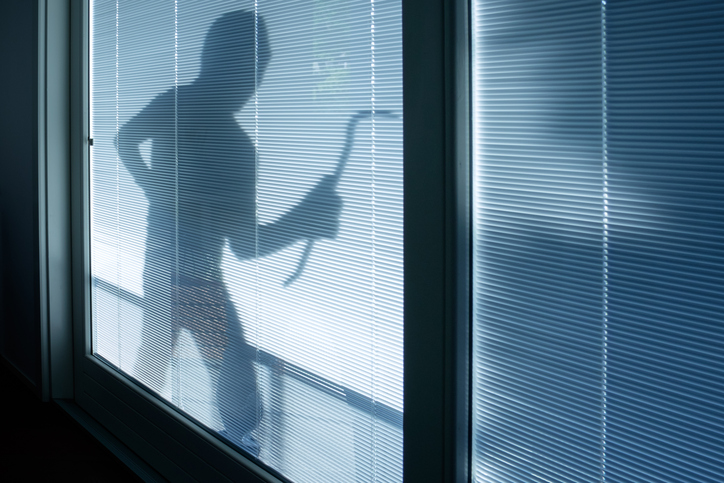Types of Burglary in Florida
There are three types of burglary crimes in Florida based on the premise being entered with the intent to commit a crime once inside. If you’ve been charged with any burglary crime, contact Gainesville defense attorney Adam Stout to quickly begin defending your rights.
Burglary of a Dwelling
A dwelling, as defined under Florida Statute § 810.02(3), is any kind of building or conveyance with a roof over it. Additionally, the building or conveyance was designed to provide overnight lodging for people along with the surrounding curtilage. The crime itself occurs:

- When you unlawfully enter the dwelling;
- Stay inside the dwelling in secret; or
- Linger inside the dwelling after another person revokes your permission to be there with the intent to commit a crime inside.
Burglary of a Structure
Florida Statute § 810.02(4)(a) defines a structure as a temporary or permanent building that has a roof over it along with the surrounding curtilage. The crime itself occurs:
- When you unlawfully enter a structure;
- Stay inside the structure in secret; or
- Stay inside the structure after someone withdraws your permission to be inside, and you have intent to commit a crime while inside the structure.
Burglary of a Conveyance
Under Florida Statute § 810.02(4)(b), a conveyance is defined as an aircraft, motor vehicle, railroad vehicle or car, ship, sleeping car, trailer, or vessel. Burglary of a conveyance occurs:
- When you unlawfully enter a conveyance;
- Remain inside the conveyance in secret; or
- Remain inside after someone else has revoked your permission to be inside with the intent to commit a crime inside the conveyance.
Burglary Penalties In Florida
A conviction for burglary crimes in Florida ranges from a third-degree felony to second-degree felony. If you’ve been charged with burglary, it’s important to immediately contact Adam Stout, an experienced and skilled Gainesville criminal defense attorney.
Structure
Penalties for burglary of a structure depends on whether the structure was occupied or unoccupied at the time of the crime. The penalty for burglary of an unoccupied structure, a third-degree felony, includes up to 5 years in prison, up to 5 years of probation, and up to $5,000 in fines.
Burglary of an occupied structure is a second-degree felony with penalties of up to 15 years in prison, up to 15 years of probation, and up to $10,000 in fines.
Dwelling
Burglary of a dwelling is a third-degree felony with penalties of up to 15 years in prison, up to 15 years of probation, and up to $10,000 in fines.
Conveyance
Burglary of a conveyance is a third-degree felony with penalties of up to 5 years in prison, up to 5 years of probation, and up to $5,000 in fines.
Defenses To Burglary In Gainesville, FL
A skilled criminal defense attorney Gainesville residents trust, Adam Stout uses his past experience as a prosecutor to understand how the State will likely approach your case. From there, he builds the strongest defense of your rights. These are four commonly used defenses for burglary crimes.
Bystander
A bystander defense is usually invoked when two people are walking when one person impulsively decides to perform an illegal activity. A common example is entering an abandoned home or building, or a closed business. Law enforcement often charges the second person as an accomplice under the assumption they acted as a lookout for the first person. Unless the second person acted consciously or specifically said a word that assisted, caused, encouraged, or incited the first person to act, being present isn’t enough to earn a conviction.
Consent
You have the burden to prove consent was given after being charged with burglary. Yet, once the evidence has been presented, consent must be disproved beyond a reasonable doubt for the defense to fail. Consent is often used as a defense when more than one person, including the person who gave you permission to enter, uses the dwelling, structure, or conveyance. A conviction can’t occur simply because other people were unaware of your permission to enter.

Open To The Public
A dwelling, structure, or conveyance that is open to the public grants you permission to enter, regardless of what your personal reasons for entering are. Open to the public is a subset of consent, hinging on your implied consent to remain inside unless the implied consent was explicitly revoked.
Lack of Intent
To support a burglary conviction, the element of intent to commit a crime inside must be present. Generally, this intent is shown when a person entered a dwelling, structure, or conveyance with stealth.
Criminal Attorney In Gainesville, FL
Contact criminal lawyer Adam Stout if you’ve been charged with burglary in Gainesville, FL. He will explain what your rights are and help guide you through the legal process until your case is resolved. Facing burglary charges can give you an uneasy feeling about the future, but you’ll have someone on your side when you contact Stout Defense, P.A.
